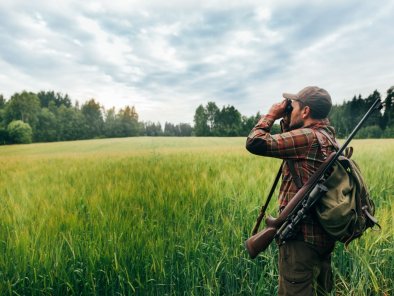Brandenbourg: Climate change and species extinction make a rapid rethink and courageous action necessary for the conversion of our forests
 The alliance of associations "For a modern hunting and forestry law" calls for an ambitious turnaround in hunting and therefore welcomes the draft amendment to the Brandenburg Hunting Law.
The alliance of associations "For a modern hunting and forestry law" calls for an ambitious turnaround in hunting and therefore welcomes the draft amendment to the Brandenburg Hunting Law.
The Brandenburg alliance of associations "For a modern hunting and forestry law", consisting of ÖJV, ANW, Waldbauernverband, BUND, Grüne Liga, NaturFreunden and NABU, today submits its joint statement on the draft of the new hunting law in Brandenburg presented by the state government on 4 March. The associations agree that this draft represents an urgently needed paradigm shift and thus opens the way to a sustainable, socially broadly accepted hunting system that not only brings forests and game into good coexistence.
The necessity for such a hunting turnaround has been known for a long time. The scientific advisory board of the Federal Ministry of Agriculture, for example, noted this in its report "Cornerstones of the Forest Strategy 2050" in 2020 and recognised the change in hunting laws as an essential step with which forest owners must be given the opportunity to adjust the game stocks in their forests in such a way that the regeneration of all tree species is possible even without browsing protection measures. This admonition of science is now finally being heard in Brandenburg.
Eckhard Fuhr, deputy chairman of the Ecological Hunting Association Brandenburg-Berlin (ÖJV) explains: "There are three important guiding ideas behind this reorientation of hunting in Brandenburg. These are the strengthening of the owners by drastically reducing the minimum size for proprietary hunts, a far-reaching de-bureaucratisation of hunting by abolishing all shooting plans and the strengthening of animal protection."
In Brandenburg, the limit for a proprietary hunt is currently at least 150 hectares. "This excludes 99 per cent of landowners from hunting on their own land. They are compulsorily members of hunting cooperatives with their land and can thus hardly influence how hunting is carried out on their own land," Enno Rosenthal, chairman of the Forest Farmers' Association, notes with disillusionment. "So it is almost impossible to hunt more intensively in a mosaic-like manner, selectively, where forest conversion is currently taking place and species-rich mixed forests are to be initialised," adds Dietrich Mehl, Chairman of the Working Group for Nature-Oriented Forestry (ANW). "A drastic reduction to a minimum size of 10 hectares gives landowners who want to do so the chance to hunt on their own land according to their economic and ecological goals. However, no one is forced to do so," Mehl continues.
However, the innovations to strengthen animal welfare in the context of hunting are also important. These include, for example, the introduction of a regular qualified shooting performance certificate, the ban on shooting dogs and cats or the permission and obligation to hunt injured game without regard to hunting boundaries. "Particularly important to us is also the reduction of huntable species, so that, for example, all species under nature protection have been taken out of the hunting law, that in the future hunting must be lead-free, no killing traps may be used, and even building hunting in natural burrows is to be prohibited," states Karl-Heinz Marschka, hunting expert on the board of NABU Brandenburg.
With the new hunting law, hunting is clearly defined as a service within the framework of economic and ecological owner interests as well as the common good. Hunting as an end in itself would thus have had its day. Peter Schendel of the Grüne Liga Brandenburg e.V. takes it a bit further: "With the upcoming reform of the hunting law, we have a great opportunity to help the forest ecosystem in its entirety. A misunderstood focus on hunting has caused the populations of a few species to increase enormously. Even a browsing rate of more than 10% on young trees endangers the forest's transformation and, in turn, all the animal and plant species that depend on it."
The blockade attitude of the state hunting association, in which the hunting tenants set the tone, is not surprising but very disappointing in view of the urgently needed hunting reform for species-rich forests with game instead of tree steppes dominated by game.
Carsten Preuß, Chairman of BUND Brandenburg, affirms: "The indispensable justification for such a far-reaching reform of the hunting system lies in the challenges that climate change poses for the preservation and development of vital forests, especially in Brandenburg. The necessary forest conversion must have absolute priority over the preservation of hunting-friendly game populations. If forest conversion is successful, this will also increase the habitat capacity for game."
For the rural area and its stakeholders, the draft law offers a wealth of new opportunities and thus also promotes social coexistence.
Download the position paper of the associations as pdf here (in German).

